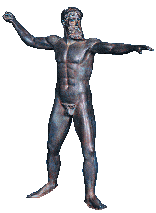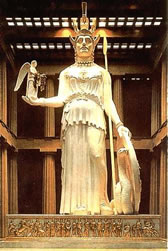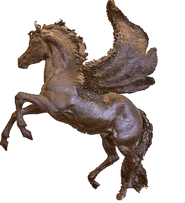
The gray-eyed Athene, also known as Minerva, will henceforth be the patron of the newly named city of Athens after a single vote allowed her to triumph over her uncle Poseidon. The citizens cheered Athene into her position, as King Cecrops, who Apollodorus calls "a son of the soil," bore witness to Athene’s planting of the olive tree (3.14.1). It is said that the olive tree will help Athens rise in economic power because the citizens of the new city will be able to export its fruit and the oil from its fruit. Meanwhile, Poseidon produced a far less beneficial gift to the Athenians.
Apollodorus said that Poseidon had arrived on the land first and that Poseidon "struck the ground in the middle of the Acropolis with his trident, producing the sea which they now call Erechtheis" (3.14.1)! But Ovid claims that Poseidon only created a gush of saltwater (165), while others say that Poseidon "produced only a saltwater spring" (Harris 8). Although saltwater can be helpful when you are trying to purify certain things for certain rituals, Athene’s olives are guaranteed to help the city prosper.
Even though Apollodorus stated that Athene planted the olive tree, Ovid tells us that the most exciting moment was when Athene’s spear pierced the earth and an olive tree "shot up heavy with olives on its boughs" and that the gods marveled at the victorious Athene (165). Ovid’s description is full of hope and the promise of good things to come, but Pausanias asserts that the Persians will one day set a fire on the Acropolis, where Athene has created the olive tree, and that the olive tree will burn down; but then he believes that the tree will rise out of the ground again the same day "to the height of two cubits" (1.27.2.). We might expect that the Athenians are not looking forward to that fire…but this is a miraculous tree at which even the gods marvel, so the Athenians have to be proud of that.

A particularly important point about this contest between Athene and her uncle is that some say that the contest caused a flood when Poseidon became angry at the outcome (Apollodorus 3.14.1). Many Athenians were very upset that their livestock and crops were washed away in the flood. And, as a result of this deluge, the Athenians tried to appease Poseidon by taking the vote away from women (Hamilton 394). This was a decision made by the male Athenians because when the citizens voted on whether Athene or Poseidon should be the new patron of the city, the one vote that allowed Athene to win over Poseidon was a woman’s. The men of Athens were just as angry as Poseidon because as a sea faring people, Poseidon was still very important to them. Some Athenians even say that women will be further punished by disallowing them to "pass on their names to their own children, or even to be called Athenians" (Harris 9). So, although the Athenians have gained a great female protectress, they have also prevented the Athenian women from participating in the democracy.
Athene began her patronage by announcing that she would establish a legal system to help justly try cases against those who are accused of crimes, as opposed to the "ancient system (represented by the Erinyes [or Furies]) of blood-guilt and vengeance" (Morford 325). She stated that the first case she would participate in would be that of Orestes. Athene announced:
Citizens of Athens, hear my declaration / At this first trial in the history of man. / This great tribunal shall remain in power / Meeting in solemn session on this hill, / Where long ago Amazons encamped / When they made war on Theseus, and sacrificed / To Ares—hence its name. Here reverence / For law and inbred fear among my people / Shall hold their hands from evil night and day, / Only let them not tamper with the laws / But keep the fountain pure and sweet to drink. / I warn you not to banish from your lives / All terror but to seek the mean between / Autocracy and anarchy; and in this way / You shall possess in ages yet unborn / An impregnable fortress of liberty / Such as no people throughout the world. / With these words I establish this tribunal, / Grave, quick to anger, incorruptible, / And always vigilant over those that sleep. Aeschylus, lines 491-510.
Her dedication to justice and democracy is promising for the people of Athens. She even promised to transform the vindictive Furies into the benevolent Eumenides. The Athenians should be able to look forward to a more fair and impartial system of government.
Soon after Athene’s announcement, Hephaestus tried to tempt the chaste goddess by limping over to her and making some advances, but she refused him. As Apollodorus recalled, Athene had wanted to see Hephaestus in order to gain some weapons, but that when he came close to her he became too excited and "ejaculated on the leg of the goddess and she in disgust wiped off the sperm with a piece of wool and threw it on the ground" (3.14.6). All of the Athenians must have felt terrible for their patron, except that from this union a child named Erichthonius was born. Athene decided to take care of the child and sent him to live with the daughters of the first King of Attica, Cecrops.
Athene wanted Erichthonius to become immortal and sent him off in a woven box with the strictest orders to Cecrops’s daughters not to open the box. According to Ovid, Erichthonius was Athene’s secret and she did not want them prying into her restricted box. But the sisters taunted each other about being too afraid to open the container and eventually one of the sisters, Aglauros, as Ovid reports, opened the box and viewed a "half dragon" looking child (73). Apollodorus claimed to have heard from some people that Athene, out of anger, may have driven the sisters mad and caused them to jump from the Acropolis, and he said that others told him that the baby snake-child killed the sisters (3.14.6). Apparently some people believe that Erichthonius has a snake body, while others think that his little body was simply wrapped in snakes. Despite what Erichthonius may or may not have looked like, Athene took him back and raised him herself. Since then, he became king of Athens and called for all the Athenians to celebrate the Panathenaea in honor of Athene’s birth.

It is on the Acropolis that the Athenians will celebrate the Panathenaea every July and then celebrate the Great Panathenaea every four years (Harris 14). It has been confirmed by Strabo that the Acropolis is the "sacred precinct of Athene" and that Ictinus has built the Parthenon which was a project supervised by Pericles (9.1.12, 16). The Parthenon is the name of Athene’s temple, where the procession of worshipers is led during the festivity. During the first Panathenaea, some people observed the participants listening to recitations of Homer’s Iliad and Odyssey during the ceremonies. And many Athenians say that during the Great Panathenaea there will be "horse races, athletic games, and musical contests" (Harris 14). One reason that horse races may be important to these celebrations is because it has been declared that Athene was the creator of the bridle, and that she tamed horses for mankind (Hamilton 29). The most honored position for the participants is probably the carrying of the peplos to the statue of Athene at the Erechtheum. The peplos is the ceremonial robe that the Athenians will use to adorn the statue of Athene. Pheidias, the great sculptor, created another statue of Athene, made of ivory, for the Parthenon. The magnificent work that Pheidias created for the Parthenon is a source of great honor for the Athenians. But they are careful not to offend the gods with hubris.
It has been reported by some people that Athene can get terribly offended or angry with people for opposing her or the other gods. This is a point of which the Athenians must be aware. Some informants have told me that some of the people that have offended her are Arachne, Tiresias, Paris, and Little Ajax. Arachne, as I was told, was a weaver that was good enough to be comparable to Athene herself, but she had too much pride in her work and thus offended Athene. Arachne even went as far as to challenge Athene to see who was better. It should be said that Athene gave Arachne every chance to recant her boasting statements, because, according to my informant, Athene transformed herself into an old woman and tried to convince Arachne to retract her boasts, but Arachne refused. In truth, it is said that Arachne was a better weaver than Athene. Even so, Athene had tried to warn Arachne, even through her loom, by presenting depictions of "mortals who challenged gods" but Arachne created a loom portraying "scenes of the gods’ less honorable amorous conquests" (Morford 112-113). In the end, Athene became so enraged by Arachne’s hubris and ignorance that she "slashed" Arachne’s face four times and then turned her into a spider, so that Arachne might weave for the rest of her life (Ovid 166-167).
Tiresias, the prophet, was also changed because of his encounter with Athene. It has been argued that Tiresias’s blindness was not due to Athene, but Hera when she became angry over Tiresias’s answer to the question of "which gender enjoyed sex more" (Harris 634). However, my informant assures me that Tiresias was walking on Mount Helicon when he came to the Hippocrene fountain and saw Athene and Chariclo bathing. Athene did make Tiresias blind for viewing what "mortal eyes should not have seen" but she was also merciful and gave him the gift of prophesy (Morford 316). It seems that Athene is indeed a just and wise goddess…but Paris definitely upset her when he chose Aphrodite as the most beautiful in a contest between Aphrodite, Athene, and Hera.
Paris, the son of King Priam and Queen Hecuba of Troy, was probably too vain to be logical, which may have ultimately led to his problems, especially with Athene. During the beauty contest, the three goddesses tried to bribe Paris with gifts. Hera offered Paris power, Athene offered him victory in war or wisdom, and Aphrodite offered him the most beautiful woman in the world. Unwisely, Paris chose a woman over power, victory, or wisdom. Because of his decision, Athene staunchly supported the Greeks during the Trojan War, even though the Trojans had a temple dedicated to her. There are people that claim that when Paris met the three goddesses, he insulted Athene and Hera, and praised Aphrodite, and that this is what really caused Athene’s anger toward Paris (Morford 335), but it seems more likely that the wise Athene would be angrier that a man would choose beauty over her gift of victory or wisdom.
Another male that is said to have made an unwise choice and reaped the consequences that an angry Athene dispensed was Little (or Lesser) Ajax. Ajax was also present during the Trojan War, but he violated Cassandra, a prophetic Trojan princess who foretells the fall of Troy, on the altar of Athene. As punishment, Athene asked Poseidon to help her "give the Greeks a bitter homecoming" with a storm because "not one of the Greeks protested against the sacrilege" (Hamilton 292). This was the cause of Ajax’s death, because as Homer recounts, "Ajax went down with his long-oared fleet. First Poseidon drove him [Ajax] onto the cliffs of Gyrae, […] he’d have escaped his doom, too, despite Athene’s hate," if he had not boasted: "In the teeth of the gods […] I have escaped the ocean’s sheer abyss!" (Odyssey 4.560-6). Poseidon promptly took care of Ajax’s hubris problem by showing him the water’s sheer abyss.

Athene is not only a goddess that punishes those that offend; she often displays loyalty and assistance to some heroes. In the past, it has been told that she has had pleasant associations with Perseus, Bellerophon, Heracles, and Odysseus. The account I hear about Perseus is that with Hermes help, Athene guided Perseus during his journey and battle with the three Gorgons, one of which was Medusa. It has been stated that Athene even gave Perseus a shield and knowledge of how to use it wisely, which helped him to defeat the Gorgons. For Bellerophon, the greatest Corinthian hero, Athene is said to have given him the gift of a magic golden bridle to help him tame Pegasus (Morford 492). Homer tells a story about Bellerophon that demonstrates Bellerophon’s heroics. Homer explains that this Corinthian conqueror killed the Chimaera, a creature with a lion front, goat middle, and snake end; then Bellerophon fought and killed the Solymi, the Amazons, and then "the best men from Lycia" (Iliad 6.222-24). With this type of description of Bellerophon, the reason why Athene, the protectress, would help such a magnificent hero should be obvious. Athene also helped Argus build the ship for the Argonauts so that they could move swiftly. And Heracles was helped by Athene during his twelve labors. But perhaps the most well-known and significant hero that has a connection to Athene is Odysseus.
Odysseus, who is possibly the most strategic Greek warrior and hero of all time, shares a common quality of intelligence with Athene that allowed them to gain an extremely close relationship. Most people have heard that Athene often helps Odysseus with his plans and motivation. Homer tells us that when Odysseus returned home from his time at sea, Athene said, "That’s why I can’t forsake you in your troubles—you are so winning, so worldly-wise, so self-possessed!" (Odyssey 13.376-77). And during the slaughter in the hall, Athene roused Odysseus to fight. Then, it is reported that she helped save Odysseus from the suitors in his house by defecting long spears from hitting Odysseus. Some people suggest that she made the spears hit the walls and doors of the room instead. Athene even helped his wife, Penelope, to devise a plan to keep the suitors from completely taking the place of her missing husband, when he was still absent. There is a story that declares that Penelope proposed to the suitors that she would weave a death shroud for her father-in-law, who was not yet dead, and when she was finished, she would choose one of the men to take her absent husband’s position. The secret that she apparently kept the entire time is that she would unweave the shroud every night. It seems as if Athene will always be watching over Odysseus and his family. Such a strong and personal connection, like that of Athene and Odysseus, is possibly what the Athenians were hoping for when they elected her over Poseidon as the patron of their city.
It is understandable why the Athenians would want such an amazing goddess, as Athene, to protect them and further civilize them. But an anonymous citizen conveyed his concern that the Athenians will have to be careful not to let Athene’s superiority lead them to misuse her name. He believes that Athenians could begin to exploit their connection to Athene in order to see themselves as having the right to militarily "dominate less powerful Greek city-states" (Harris16). When a goddess that will stand up for justice and democracy, and stand next to heroes like Odysseus and Heracles, becomes the patron of a city such as Athens, the
Athenians will no doubt stand a little taller…but they must remember not to stand too tall or they might make Athene angry.
Works Cited
Aeschylus. Eumenides. Trans. George Thompson. Eds. Stephen L. Harris and Gloria Platzner. Classical Mythology: Images and Insights. 4th ed. New York: McGraw, 2004. 605-626.
Apollodorus. Gods and Heroes of the Greeks: The Library of Apollodorus. Trans. Michael Simpson. Amherst: U of Massachusetts P, 1976. NetLibrary. U of Central Oklahoma. 26
Jan. 2007 < http://www.netlibrary.com.vortex2.ucok.edu:2050/Details.aspx?ProductId=26443>.
Hamilton, Edith. Mythology. 1942. Boston: Back-Little, 1998.
Harris, Stephen L., and Gloria Platzner. Classical Mythology: Images and Insights. 4th ed. New York: McGraw, 2004.
Homer. The Iliad. Trans. Robert Fagles. 1990. New York: Penguin, 1998.
---. The Odyssey. Trans. Robert Fagles. 1996. New York: Penguin, 1997.
Morford, Mark P.O., and Robert J. Lenardon. Classical Mythology. 6th ed. New York: Longman, 1999.
Ovid. The Metamorphoses. Trans. Horace Gregory. 1958. New York: Mentor, 1960.
Pausanias. Description of Greece. Trans. W.H.S. Jones, Litt.D., and H.A. Ormerod. Cambridge: Harvard UP, 1918. The Perseus Digital Library. Ed. Gregory Crane. Boston: Tufts U. 26 Jan. 2007 <http://www.perseus.tufts.edu/cgi-bin/ptext?lookup=Paus.+1.1.1>.
Strabo. Geography. Ed. H.C. Hamilton. Cambridge: Harvard UP, 1924. The Perseus Digital Library. Ed. Gregory Crane. Boston: Tufts U. 26 Jan. 2007 <http://www.perseus.tufts.edu/cgi-bin//ptext?lookup=Strab.+9.1.1>.